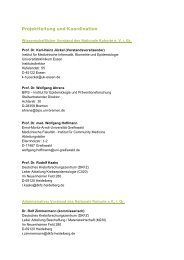Scientific Concept of the National Cohort (status ... - Nationale Kohorte
Scientific Concept of the National Cohort (status ... - Nationale Kohorte
Scientific Concept of the National Cohort (status ... - Nationale Kohorte
You also want an ePaper? Increase the reach of your titles
YUMPU automatically turns print PDFs into web optimized ePapers that Google loves.
C.1<br />
C.1 Annex: Description <strong>of</strong> <strong>the</strong> study centers<br />
surveys which challenged <strong>the</strong> concept <strong>of</strong> fibromyalgia as a distinct rheumatological disease<br />
entity, a large cohort study <strong>of</strong> initially 10,000 subjects to develop an algorithm to assess<br />
rehabilitation needs <strong>of</strong> insurants <strong>of</strong> a regional statutory pension fund for blue collar workers<br />
with severe, disabling BP (Luebeck Algorithm). A previous population-based survey in Hanover<br />
addressed more than 11,000 adult residents <strong>of</strong> <strong>the</strong> city studying <strong>the</strong> prevalence and<br />
health care for rheumatoid arthritis and various rheumatic complaints, including back pain.<br />
Since 1997, <strong>the</strong> Institute for Cancer Epidemiology (IKE) is running <strong>the</strong> populationbased<br />
cancer registry <strong>of</strong> Schleswig-Holstein (in cooperation with <strong>the</strong> medical association<br />
Schleswig-Holstein). Each year, approximately 20,000 incident cases occur in <strong>the</strong> area. The<br />
registry processes some 50,000 notifications (mandatory notification) and 30,000 death<br />
certificates per year. Currently more than 600,000 notifications representing more than<br />
250,000 cancer patients are stored in <strong>the</strong> registry. These data are used for multiple purposes,<br />
including public health reporting, small area analyses, or epidemiologic research.<br />
Fur<strong>the</strong>rmore, several large cohort studies were or are being conducted at <strong>the</strong> institute, as<br />
<strong>the</strong> worldwide largest controlled cohort study <strong>of</strong> children conceived after employing artificial<br />
reproductive techniques (ICSI follow-up study = intra cytoplasmatic sperm injection,<br />
n=3,300) or <strong>the</strong> OVIS study (health care research in cancer survivors, n=5,000). Since<br />
2001, a cohort <strong>of</strong> women after diagnostic mammography is being built up and analyzed.<br />
Up to now more than 300,000 women have been documented, and a record linkage to <strong>the</strong><br />
cancer registry was established.<br />
In 2011 <strong>the</strong> University <strong>of</strong> Luebeck launched <strong>the</strong> recently established Institute for Clinical Epidemiology<br />
(IfKE) (W3 pr<strong>of</strong>essorship in epidemiology). The new institute will work in close<br />
collaboration with <strong>the</strong> Institute for Cancer Epidemiology and support <strong>the</strong> academic center<br />
<strong>of</strong> population medicine and health care research.<br />
Research activities at Medical Department II <strong>of</strong> <strong>the</strong> UzL are focused upon epidemiologic<br />
aspects <strong>of</strong> cardiac geometry and function and on <strong>the</strong> molecular genetics <strong>of</strong> MI. The investigators<br />
have more than 15 years <strong>of</strong> experience in conducting epidemiologic research in<br />
<strong>the</strong> context <strong>of</strong> <strong>the</strong> MONICA studies. In particular, ECG studies were introduced and repeatedly<br />
carried out in <strong>the</strong> Augsburg KORA study, producing multiple novel observations. With<br />
respect to MI genetics <strong>the</strong> group coordinates <strong>the</strong> German (NGFN, A<strong>the</strong>rogenomics), European<br />
(EU frame-work 6, Cardiogenics), and global initiatives (CARDIoGRAM) on genomewide<br />
association studies for this pertinent disease.<br />
Description <strong>of</strong> <strong>the</strong> study center Kiel<br />
For <strong>the</strong> <strong>National</strong> cohort, <strong>the</strong> Biobank popgen will be responsible for <strong>the</strong> field work <strong>of</strong> recruiting<br />
10,000 study participants in Schleswig-Holstein and <strong>the</strong>refore a study center will be established<br />
at <strong>the</strong> University Hospital Schleswig-Holstein, campus Kiel. Popgen will be responsible<br />
for all tasks related to recruitment and follow-up, with assistance by <strong>the</strong> partner institutes at<br />
<strong>the</strong> CAU and UzL. For example <strong>the</strong> ICMB will assist in collecting biomaterials whereas IMIS<br />
and SP-PM will supervise ethical and data safety issues. IfSM and IfKE will be responsible<br />
for exposure assessments related to health care research, IKE will be responsible for record<br />
linkages to <strong>the</strong> cancer registry Schleswig-Holstein during follow-up and <strong>the</strong> Medical Department<br />
II will be responsible for cardiovascular phenotyping following <strong>the</strong> general protocol <strong>of</strong><br />
<strong>the</strong> <strong>National</strong> <strong>Cohort</strong>. Comprehensive non responder analyses will be done at IfKE.<br />
In Kiel 10,000 individuals will be recruited including inhabitants <strong>of</strong> <strong>the</strong> city <strong>of</strong> Kiel and adjacent<br />
municipalities. The catchment area for <strong>the</strong> SH cluster will include <strong>the</strong> city <strong>of</strong> Kiel<br />
(population 170,000) and adjacent municipalities (population 175,000). This results in a total<br />
source population <strong>of</strong> about 345,000. Registration <strong>of</strong>fices for drawing random populationbased<br />
samples have been successfully accessed in <strong>the</strong> past.<br />
266



